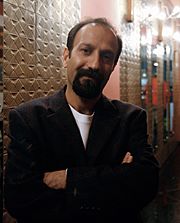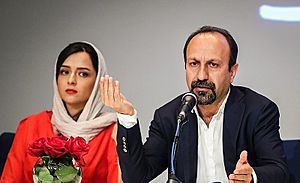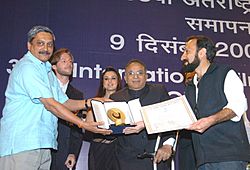Asghar Farhadi facts for kids
Quick facts for kids
Asghar Farhadi
|
|
|---|---|
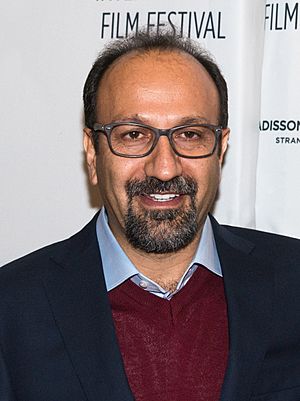
Farhadi at the 2018 Stockholm International Film Festival
|
|
| Born | 7 May 1972 Homayoon Shahr, Isfahan province, Imperial State of Iran
|
| Alma mater | University of Tehran Tarbiat Modares University |
| Occupation |
|
| Years active | 1997–present |
|
Notable work
|
About Elly (2009) A Separation (2011) The Past (2013) The Salesman (2016) Everybody Knows (2018) A Hero (2021) |
| Spouse(s) |
Parisa Bakhtavar
(m. 1990) |
| Children | 2, including Sarina Farhadi |
Asghar Farhadi (Persian: اصغر فرهادی; born on May 7, 1972) is a famous film director and screenwriter from Iran. He is known as one of the most important filmmakers in Iranian cinema and around the world in the 21st century. His movies are special because they look closely at how people live. They often tell personal and sometimes challenging stories about problems within families. In 2012, Time magazine named him one of the 100 most influential people in the world. That same year, he also received a special award from France called the Legion of Honour.
Farhadi started directing films with a drama called Dancing in the Dust (2003). After that, he made The Beautiful City (2004) and Fireworks Wednesday (2006). He became very well-known for his film About Elly (2009), which won him the Silver Bear for Best Director award. He is one of the few directors in the world to win the Academy Award for Best International Feature Film twice. He won for the family drama A Separation (2011) and for The Salesman (2016). The Salesman also won an award for its screenplay at the Cannes Film Festival.
His films The Past (2013), filmed in France, and Everybody Knows (2018), filmed in Spain, also received great praise. Farhadi returned to Iran to make A Hero (2021), which won the Grand Prix at the Cannes Film Festival.
Contents
Growing Up and Learning
Farhadi was born in Homayoon Shahr, a city in the Isfahan province of Iran. When he was 15, in 1987, he joined the Isfahan branch of the Iranian Youth Cinema Society. This group helped young people learn about filmmaking. There, he made several short films. He also studied theater in college, earning degrees in dramatic arts and stage direction from University of Tehran and Tarbiat Modares University.
His Film Career
Early Films: 2003–2009
Farhadi began his career by making many short films using 8mm and 16mm cameras. He did this at the Iranian Young Cinema Society in Isfahan. Later, he started writing plays and screenplays for IRIB, which is Iran's national TV. He also directed TV shows like A Tale of a City.
In 2003, Farhadi directed his first full-length movie, Dancing in the Dust. It was about a man trying to earn money for his wedding. Critics praised Farhadi as a rising filmmaker. The film was nominated at the 25th Moscow International Film Festival and won three awards at the Asia-Pacific Film Festival.
Farhadi's second film was The Beautiful City, released in 2004. This movie was about a young man turning 18 in a detention center, where he was held for a crime. The film was praised for showing how Iran's justice system works. Farhadi won the Grand Prix at the Warsaw Film Festival for this movie.
His third film, Fireworks Wednesday, won the Gold Hugo at the 2006 Chicago International Film Festival. The story takes place just before the Persian New Year, when people light fireworks. It shows a family argument that happens during this time. Critics noted how Farhadi kept viewers guessing and made them think about the characters' actions.
In 2009, Farhadi directed his fourth film, About Elly. This movie focused on middle-class families in Iran. It received strong reviews, with one critic calling it "absorbing" and "suspenseful." The film won Farhadi the Silver Bear for Best Director at the Berlin International Film Festival and Best Picture at the Tribeca Film Festival. About Elly tells the story of a group of Iranians whose trip to the Caspian Sea beaches turns into a tragedy.
Becoming Famous: 2011–2016
Farhadi's film A Separation first showed in February 2011 in Tehran. It quickly received great reviews from film critics in Iran. Farhadi won four awards for it, including Best Director. In February 2011, it also competed at the 61st Berlin International Film Festival and won the Golden Bear for best film. This was the first time an Iranian film had won this award.
In June 2011, A Separation won the Sydney Film Prize. It also won the Best Film award at the 2011 Asia Pacific Screen Awards. Many critics praised Farhadi for showing a detailed picture of Iranian life. One critic said the film showed a "nuanced nation" where "decent characters are trying to do the right thing."
In December 2011, Farhadi was chosen to be a jury member for the 62nd Berlin International Film Festival in 2012. In January 2012, A Separation won the Golden Globe for Best Foreign Language Film. The film was also chosen by Iran to compete for the Academy Award for Best Foreign Language Film at the 84th Academy Awards in 2012. It was also nominated for Best Original Screenplay.
On February 26, 2012, A Separation made history by becoming the first Iranian movie to win the Academy Award for Best International Feature Film. This also made Farhadi the first Iranian to win an Academy Award in any competitive category. Famous directors and actors like Steven Spielberg and Meryl Streep praised his film. Farhadi was invited to join the Academy of Motion Picture Arts and Sciences in June 2012. A Separation also won the César Award for Best Foreign Film and the Independent Spirit Award for Best International Film in 2012.
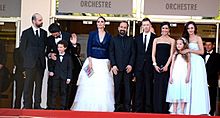
In 2013, Farhadi's film The Past was released. It starred Bérénice Bejo and Tahar Rahim and was Farhadi's first film made in French. The film competed for the Palme d'Or at the 2013 Cannes Film Festival. Bejo won the Best Actress Award at Cannes for her role. The film was highly praised by critics. It was nominated for a Golden Globe Award for Best Foreign Language Film and was Iran's entry for the Academy Award for Best Foreign Language Film in 2014, but it was not nominated.
His 2016 film The Salesman, starring Shahab Hosseini and Taraneh Alidoosti, also competed for the Palme d'Or at the 2016 Cannes Film Festival. It won two awards: Best Actor for Shahab Hosseini and Best Screenplay for Farhadi. The film is about a married couple whose lives change after a difficult event happens to the wife. The husband tries to find out what happened, while the wife struggles to deal with the emotional impact. During this time, the husband is also performing in a play called Death of a Salesman. Farhadi chose this play because it shared similar themes with his film. The film was made together by Iran and France and was filmed in Tehran in 2015. Critics praised Farhadi for showing how quickly conflicts can change everyday lives.
On February 26, 2017, Farhadi won his second Oscar for Academy Award for Best International Feature Film for The Salesman at the 89th Academy Awards. However, Farhadi decided not to attend the ceremony. This was to protest a new rule by the then President of the United States of America Donald Trump that stopped people from Iran and six other countries from entering the U.S. Farhadi announced that two important Iranian Americans, Anousheh Ansari and Firouz Naderi, would accept the award for him. Anousheh Ansari is famous for being the first female space tourist and the first Iranian in space. Firouz Naderi was a director at NASA.
Before the Oscar ceremony, Farhadi spoke to a group of protesters in London through a video call from Iran. The Mayor of London, Sadiq Khan, showed The Salesman publicly in Trafalgar Square to celebrate the city's diversity. Farhadi said he hoped this movement would "continue and spread" to stand up against unfair political powers.
When The Salesman won the Oscar, Anousheh Ansari read a statement from Farhadi. He said he was not there out of respect for the people of his country and the other six nations affected by the "inhumane law" that banned immigrants. He explained that dividing the world into "us and our enemies" creates fear and leads to aggression and war. He added that filmmakers can show what people have in common and break stereotypes, creating empathy that is needed more than ever. Before the ceremony, all five directors nominated for Best Foreign Language Film, including Farhadi, released a joint statement. They spoke against "the climate of fanaticism and nationalism" and dedicated the Oscar to "all the people, artists, journalists and activists who are working to foster unity and understanding."
Recent Work: 2018–Present

In 2018, Farhadi directed his eighth feature film, Everybody Knows. It starred Javier Bardem, Penélope Cruz, and Ricardo Darin. This film was a Spanish psychological thriller and was shown at the 2018 Cannes Film Festival. It competed for the Palme d'Or. At the film's premiere in Toronto, Farhadi mentioned he hoped to bring one of his plays to London's West End theater district. The film received good reviews, with critics praising the main actors.
A Hero is Farhadi's ninth feature film. It was filmed in Marvdasht, Iran, and tells a social story. The film stars Amir Jadidi, Mohsen Tanabandeh, Fereshteh Sadre Orafaee, Sarina Farhadi, and Sahar Goldoust. A Hero was chosen to represent Iranian cinema at the 94th Academy Awards in 2022.
In April 2022, there were discussions about whether Farhadi had used ideas from a documentary made by a former film student for A Hero. However, in March 2024, an Iranian court officially said that Farhadi was not guilty of these claims. This decision was made after experts in copyright law reviewed the case.
Themes in His Films
Social and Class Differences
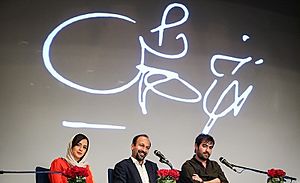
Farhadi's films often show a small picture of modern Iran. They explore the challenges that come from differences in social class, gender, and religious beliefs. For example, his 2011 film A Separation shows many difficult conflicts and arguments. These situations make the characters think about the right and wrong of their own choices.
Film critics have noted that Farhadi's movies are detailed pictures of how different classes, genders, and social groups interact. They explore how small personal choices can affect the connections between people in a community.
The film critic Roger Ebert wrote about Farhadi's skill in showing social relationships. He said that Farhadi tells his stories fairly and aims to show empathy. Ebert noted that A Separation gives a good picture of Iran today, showing a complex nation where good people try to do the right thing. He also found it interesting that the film gets viewers deeply involved without telling them who is right or wrong.
Film critic Tina Hassannia wrote in her 2014 book that Farhadi's films show "social realism." This means they observe the culture through a style that feels like a documentary. Yet, he uses melodrama in a very skilled way. His comments on society, even if they seem sad, never feel like he is lecturing or judging.
Farhadi's films show that Iran has a strict class system that has lasted for a long time. He films the complex everyday life in Iran today. He focuses on how different viewpoints are shaped by social structures like class and gender. Farhadi is also known for his "open ending movies," which are realistic and leave some things for the audience to think about.
Cultural Rules
Farhadi's films often gently criticize the divisions in Iranian society based on class, gender, and religion. However, he does this in a very subtle way. Farhadi has always shown his love for Iran and its people. He has often expressed his commitment to his country, especially when he won the Academy Award twice. When he won for A Separation, he dedicated the award to the Iranian nation. When The Salesman won, he chose not to attend the ceremony to protest the Trump travel ban.
Less noticed is how he subtly questions some religious standards in Iran. His first film, Dancing in the Dust, starts with an Islamic prayer. But then, the camera shows a large statue of a man in the street. In Islam, making human statues can be seen as wrong. For his second film, Beautiful City, Farhadi did something similar. As a prison loudspeaker plays a religious phrase, it shows a young man carving human figures. These early films are not as widely known as his later ones.
What Influences Him
In 2012, Farhadi took part in the Sight & Sound film polls. These polls happen every ten years to find the greatest films of all time. Directors were asked to pick ten films that influenced them. Here are Farhadi's choices:
- Rashomon (Japan, 1950)
- The Big Road (China, 1935)
- The Godfather (US, 1972)
- Tokyo Story (Japan, 1953)
- The Apartment (US, 1960)
- Three Colors: Red (France, 1994)
- Take the Money and Run (US, 1969)
- Persona (Sweden, 1966)
- Taxi Driver (US, 1976)
- Modern Times (US, 1936)
Filmography
Feature Films
| Year | English Title | Original Title | Director | Writer | Producer | Notes |
|---|---|---|---|---|---|---|
| 2003 | Dancing in the Dust | رقص در غبار | Yes | Yes | No | |
| 2004 | The Beautiful City | شهر زیبا | Yes | Yes | No | |
| 2006 | Fireworks Wednesday | چهارشنبهسوری | Yes | Yes | No | |
| 2009 | About Elly | درباره الی | Yes | Yes | Yes | |
| 2011 | A Separation | جدایی نادر از سیمین | Yes | Yes | Yes | |
| 2013 | The Past | Le passé / گذشته | Yes | Yes | No | |
| 2016 | The Salesman | فروشنده | Yes | Yes | Yes | |
| 2018 | Everybody Knows | Todos lo saben | Yes | Yes | No | |
| 2021 | A Hero | قهرمان | Yes | Yes | Yes | |
| TBA | Parallel Tales | Histoires Parallèles | Yes | Yes | Yes |
Other Film Work
| Year | English Title | Original Title | Notes |
|---|---|---|---|
| 2002 | Low Heights | Only writer, co-written with Ebrahim Hatamikia | |
| 2007 | Canaan | Co-written with Mani Haghighi | |
| 2008 | Tambourine | ||
| 2009 | Trial on the Street | Co-written with Masoud Kimiai | |
Television Work
| Year | Title | Director | Writer | Producer | Broadcast |
|---|---|---|---|---|---|
| 1998 | The Waiter | Yes | Yes | Yes | IRIB TV5 |
| Doctors | No | No | Yes | IRIB TV3 | |
| Farrokh & Faraj Residential Complex | Yes | No | No | IRIB TV2 | |
| 1999 | Youthful Days | No | No | Yes | IRIB TV5 |
| A Tale of a City | Yes | Yes | Yes | IRIB TV5 | |
| 2001 | A Tale of a City II | Yes | Yes | Yes | IRIB TV5 |
Awards and Special Recognitions
Asghar Farhadi is one of only a few directors who have won the Best Foreign Film Oscar more than once. Other directors who have done this include Vittorio de Sica and Federico Fellini (who won four times each), Ingmar Bergman (three times), and René Clément and Akira Kurosawa (twice each). Here are some of his most important awards:
- A Separation won the Academy Award for Best Foreign Language Film in 2012. It was the first Iranian film to win this award. The film was also nominated for the Academy Award for Best Original Screenplay.
- The Salesman won the Academy Award for Best Foreign Language Film in 2017. Farhadi chose not to attend the 89th Academy Awards ceremony to protest a U.S. travel ban.
- A Hero won the Hafez Award for Best Director – Motion Picture and Best Screenplay – Motion Picture in 2021.
Special Honors
- Legion of Honour from France (2012)
- Named a Top 100 Global Thinker by Foreign Policy magazine (2012)
Images for kids
See also
 In Spanish: Asghar Farhadi para niños
In Spanish: Asghar Farhadi para niños
 | Sharif Bey |
 | Hale Woodruff |
 | Richmond Barthé |
 | Purvis Young |


